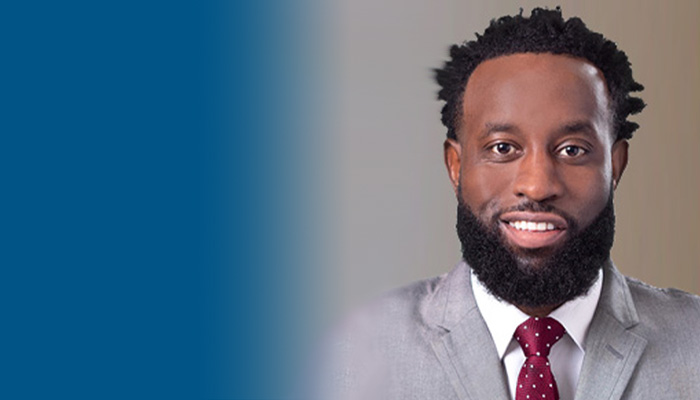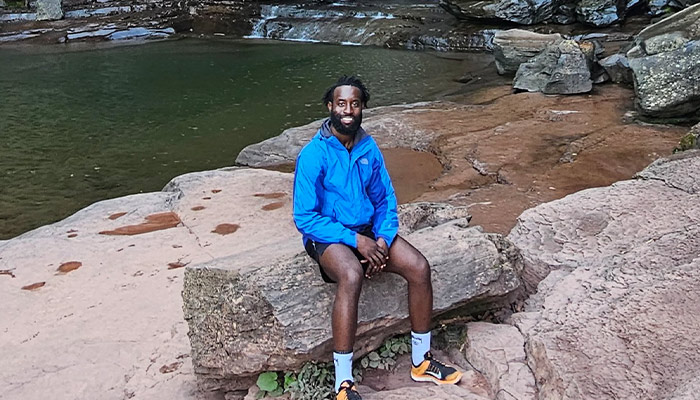HOW CAN WE HELP YOU? Call 1-800-TRY-CHOP
In This Section
Understanding Disparities in Pediatric Cardiac Arrest: Q&A With Cody Gathers, MD

Cody Gathers, MD
Editor's Note: Our Featured Research Trainee for February is Cody Gathers, MD, a pediatric critical care fellow and postdoctoral research fellow working to mitigate racial, ethnic, and socioeconomic disparities in pediatric cardiac arrest. Dr. Gathers is under the mentorship of Robert Sutton, MD, MSCE, and Maryam Naim, MD, MSCE, at Children's Hospital of Philadelphia. In this Q&A, Dr. Gathers discusses his research, his experiences at CHOP, and his thoughts on Black History Month.
Can you tell us where you earned your degrees, and your current role at CHOP?
I completed my undergraduate degree at Clemson University, where I majored in biochemistry, with a minor in military leadership. After graduation, I moved to Charleston to attend the Medical University of South Carolina. I subsequently completed my residency in pediatrics at the Boston Combined Residency Program in the Leadership in Equity and Advocacy Track at Boston Children's Hospital and Boston Medical Center.
I am currently in the last year of my pediatric critical care fellowship at CHOP, and I am also a National Institutes of Health T32 postdoctoral research fellow in the National Clinical Scholars Program at the University of Pennsylvania. Through this program, I am obtaining a Master of Science in health policy. After this, I will complete a pediatric cardiology fellowship at CHOP.
What message do you hope people take away from celebrating Black History Month?
I hope people truly see the contributions that members of the Black community have made to advance medicine. Moreover, I implore everyone to give appropriate credit for those contributions. Dr. Marilyn Gaston, Vivien Thomas, and Dr. Kizzmekia Corbett, to name a few, have all improved our lives with their research, and their work will change the lives of children forever.
Additionally, I want people to develop a deeper understanding and appreciation for Black culture. Having a better understanding of what that means will improve diversity and the sense of inclusion and belonging in the workplace.
What is a research project you're working on, and why is it important?
I have worked primarily under the mentorship of Dr. Sutton and Dr. Naim to better understand racial, ethnic, and socioeconomic disparities in cardiac arrest. While we know that disparities in cardiac arrest survival exist, we have not clearly identified why they exist. Efforts needed to mitigate these disparities are unfortunately lacking.
My current work aims to identify parental barriers to learning and performing cardiopulmonary resuscitation (CPR) with the hope of removing these barriers for parents of children who are historically marginalized in society. Specifically, by identifying high-risk areas in Philadelphia, we can target CPR education in these areas in hopes of improving CPR rates and cardiac arrest survival in our community.
Through this work, I have had the amazing opportunity to collaborate with the Philadelphia American Heart Association and other nonprofit organizations in the community. People are recognizing the importance of bystander CPR, and they want to learn. It is up to us to meet the needs of the community; we cannot expect the community to come to us.
What are some of the most salient training experiences you've had at CHOP so far?
I always find gratitude in collaborating with people at CHOP and in the community. My current work brings together a team of cardiac arrest experts, health services researchers, biostatisticians, and community leaders to tackle the critical questions we are trying to answer. After the collaboration, I love the process of scientific inquiry and developing the initial research question. How you study that question is critical. If careful attention is paid to that process, everything else starts to fall into place.
Aside from research, what do you consider your biggest accomplishment?
I am not sure I have a single biggest accomplishment, but the thing I am most proud of is that I always find time to mentor the younger generation in the midst of medical training, research, and life responsibilities. I am invested in lifting up those who come after me, similarly to the way others have helped and mentored me along the way. I would not be where I am without teachers and mentors believing in me, so I always strive to be that person for someone else. Keeping in contact with past mentees and seeing where they are — whether in medical school, residency, working in a lab, teaching at a university, or working at an engineering firm — always brings me joy, and I will be proud of them no matter where they end up.
What do you do for fun when you're not working?

When he’s not working, Dr. Gathers enjoys the outdoors by going on hikes or bike rides.
I love being around friends and loved ones. During the fall and winter months, I usually try to convince them to watch college football with me all day on Saturdays. I enjoy a good hike or bike ride, whether it is close to Philadelphia or a weekend road trip, and my co-fellows always tease me for my staunch obsession with a local brewery. I am also planning to compete in two triathlons this year, so I hope the CHOP community will wish me luck on that.


